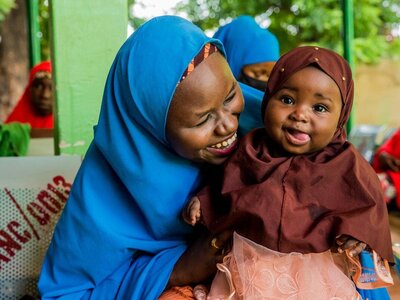Nigeria
- 35 million
- people facing acute food insecurity
- 4.8 million
- children and women require nutrition assistance annually in the northeast
- 2.3 million
- people displaced by violence and insecurity in the northeast
A record near-35 million Nigerians are facing food insecurity, driven by conflict, climate shocks, displacement and the systemic collapse of local food systems.
Escalating insurgent attacks are fuelling the unprecedented hunger crisis, driving mass displacement, collapsing livelihoods and creating fertile ground for armed group recruitment.
The northeast – particularly Borno, Adamawa and Yobe states – remains the epicentre of the crisis, with nearly 5.8 million people facing severe food insecurity in 2026. This includes 15,000 people in Borno State who are expected to face catastrophic hunger and famine-like conditions.
Children and women are at greatest risk across Borno, Sokoto, Yobe and Zamfara, where malnutrition rates are highest. This comes just as the stabilizing lifeline of food assistance risks disappearing entirely due to lack of funding.
Despite soaring needs, WFP will completely run out of resources for emergency food and nutrition assistance by March 2026.
Without urgent funding, at least 1.3 million people will be left without vital support, risking more instability and further deepening a severe hunger crisis.
WFP needs at least US$129 million for operations to continue until July 2026.
What the World Food Programme is doing in Nigeria
-
Food assistance
-
Despite severe funding constraints, in 2025 WFP kept hunger at bay in some of Nigeria’s hardest‑hit, conflict‑affected northern communities. In July alone, WFP reached more than 1.3 million people, and by December, over 700,000 vulnerable families received life‑saving food and nutrition assistance. This year, WFP aims to continue sustaining at least 700,000 people every month. Beyond emergency distributions, WFP delivers food assistance through cash transfers and specialised nutrition support for children and pregnant or breastfeeding women and girls. A suspension of food aid, however, could further destabilize the region, forcing families into impossible choices: endure hunger, flee their homes, or risk exploitation by extremist groups.
-
Nutrition
-
Livelihoods
-
Capacity strengthening
-
Logistics
-
Emergency Telecommunications Service
-
United Nations Humanitarian Air Service
Beware of fraudulent job offers
WFP is aware of fictitious employment offers being circulated via email or LinkedIn in Nigeria. Many of these schemes consist of an alleged offer of employment or contract with WFP in return for the payment of fees or providing personal or banking information. Read more
Nigeria news releases
Go to pageFind out more about the state of food security in Nigeria
Visit the food security analysis pageOperations in Nigeria
Contacts
Office
Asokoro
Abuja
Nigeria







